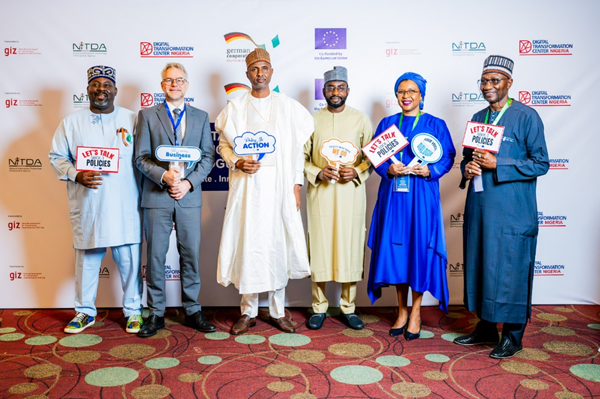
In a continuous effort to foster inclusivity between the government and citizens of Nigeria, the National Information Technology Development Agency (NITDA), in collaboration with the Digital Transformation Centre (DTC) Nigeria and Deutsche Gesellschaft für Internationale Zusammenarbeit (GIZ), organised a two-day event titled “Digital Policy Dialogue: Cooperate. Innovate.”
The event aimed at engaging stakeholders on the Participatory Policy Implementation Framework (PPIF).
Speaking during the event, NITDA’s director-general, Mallam Kashifu Abdullahi emphasised that the framework focuses on involving citizens in policy development and implementation, thereby promoting ownership and accountability. He remarked, “Today marks a remarkable milestone in our journey to reimagine the position of NITDA in the Nigerian tech ecosystem. Five years ago, NITDA faced a significant trust deficit with the tech community due to top-down policy impositions. To address this, NITDA shifted to a collaborative approach, emphasising co-design and co-creation.”
Abdullahi expressed gratitude to GIZ for their support, which began with the Nigerian Startup Act, created through a collaborative process. Following this success, GIZ and DTC assisted in developing the National Digital Literacy Framework (NDLF) through a similar participatory process. According to Abdullahi, this initiative has seen significant citizen engagement, with the creative sector recently volunteering to champion digital literacy in Nigeria.
He further highlighted NITDA’s collaboration with the National Youth Service Corps (NYSC) to train citizens across 774 local governments and the Ministry of Education to integrate digital skills into the national curriculum by next year. This effort is part of achieving the Ministry of Communication, Innovation and Digital Economy’s long-term target of 95 per cent digital literacy by 2030 and a midterm target of 70 per cent by 2027.
Abdullahi underscored that this engagement aligns with NITDA’s Strategic Roadmap and Action Plan (SRAP 2.0), which has one of its eight pillars focused on “Strengthening Policy Implementation and Legal Framework.” He added, “To ensure sustainability, GIZ and DTC are formalising a participatory policy implementation framework that can be adapted beyond the digital sector, benefiting areas such as education, agriculture and healthcare.”
He applauded all stakeholders for their past contributions and urged for continued collaboration to solidify the legal framework policy implementation in Nigeria.
The permanent secretary of the Ministry of Communications, Innovations and Digital Economy, Engr. Faruk Yabo expanded on the expectations of the PPIF in his keynote address. He stated, “The proposed framework introduces several key initiatives: establishing multi-channel stakeholder engagement, promoting collaborative decision-making through digital platforms, ensuring transparency and accountability, investing in capacity-building and implementing robust monitoring and evaluation mechanisms.”
Yabo stressed that the approach is designed to foster a participatory policy-making process and ensure that the benefits of technological advancements are equitably distributed. He disclosed that the initiative is supported by partners including the European Union and the German government, marking the beginning of a commitment to inclusivity and transparency in Nigeria’s digital policy development.
Earlier in his opening speech, coordinator of the Sustainable Economic Development Cluster (SEDEC) GIZ, Nigeria, Dr. Markus Wauschkuhn welcomed participants to the public presentation of the draft PPIF for the ICT and digital economy sectors. Wauschkuhn highlighted the vital contributions of NITDA, GIZ and all stakeholders involved in creating the PPIF. He emphasised the importance of a participatory policy-making process that includes diverse voices from individuals, communities, businesses and institutions. He accentuated that the approach aims to ensure transparency, accountability and trust in governance while addressing the rapid advancements in the digital age.
In her opening statement, head of the Digital Transformation Centre (DTC) Nigeria, Dr. Thwueba Dwani stated that involving stakeholders in policy implementation enhances sustainability and relevance, as evidenced by numerous studies. She introduced the PPIF as a crucial tool for Nigeria’s digital innovation ecosystem, developed through extensive stakeholder engagement and participatory formats.
Other agencies represented at the event included the National Council for Arts and Culture (NCAC), the Small and Medium Enterprises Development Agency of Nigeria (SMEDAN), the National Office for Technology Acquisition and Promotion (NOTAP), Civil Society Organisations, the private sector and other relevant stakeholders.


